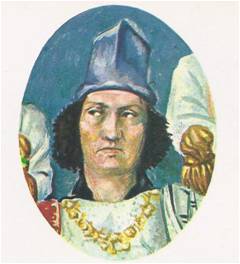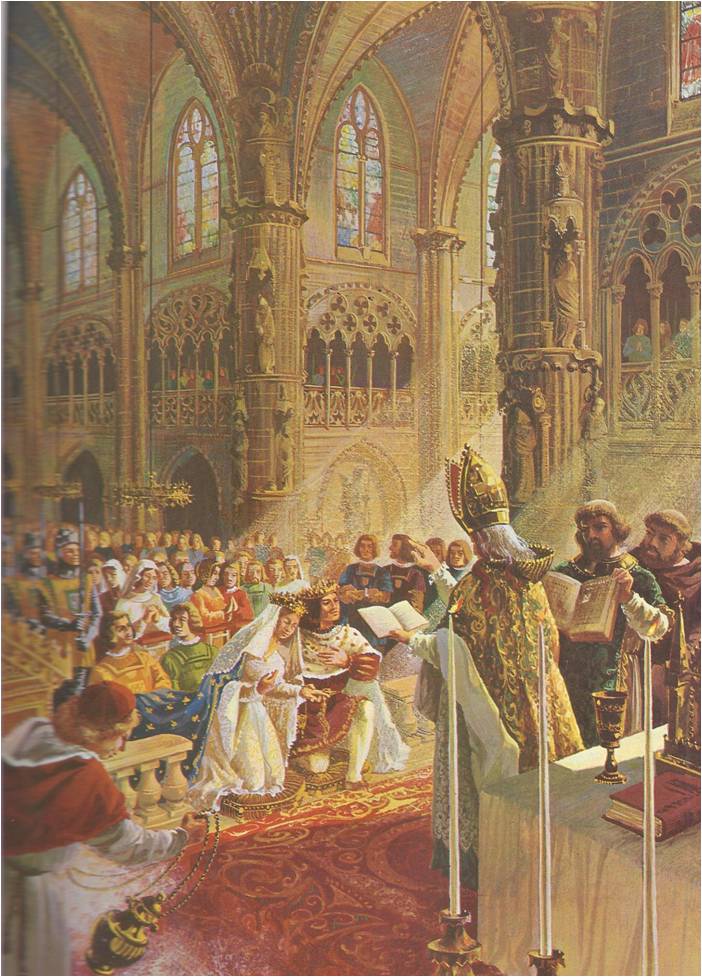IN THE LAST PART of the fifteenth century, the monks and courtiers of Moscow began to say that Moscow was destined to become the “Third Rome.” The first Rome, they said had been great as the centre of Christianity; but when the Romans had recognized the pope, Rome had been punished by destruction. The second Rome had been Constantinople, the centre of the Orthodox Church; but Constantinople, too, had briefly recognized the pope, and it, too, had fallen. Now Moscow, where the Orthodox faith still remained pure, was to become the Third Rome — the great centre of the Christian …
Read More »Age of Great Kings and Enlightenment 1469 – 1762
The Rise of Prussia 1594 – 1786
AT THE END of the 16th century, Brandenburg and Prussia were unimportant German lands, but the ruler of Brandenburg was clever and farsighted. He was John Sigismund, the head of the Hohenzollern family. In 1594 John Sigismund married the daughter of the idiot duke of Prussia. In 1618, when the duke died, John Sigismund became ruler of Prussia as well as Brandenburg. There must have been many people who laughed at John Sigismund. Brandenburg was worth little, they must have thought, so why did he want an even less valuable Prussia. The nobles were the real power in both Prussia …
Read More »The Sun King 1642 – 1715
ALL HIS LIFE Cardinal Richelieu had been a sick man, but by the spring of 1642 he was dying. He carefully made his will, leaving to the king his elegant town house, eight sets of tapestries‚ and three beds. On December 2, he received the last sacraments of his church. “Does your Eminence pardon your enemies?” asked the priest and Richelieu answered, “I have no enemies but those of the State.” When Louis XIII learned that Richelieu had died, he said, “A great statesman is dead.” To take Richelieu’s place, Louis chose Jules Cardinal Mazarin, Richelieu’s own choice for his …
Read More »The War Spreads 1625 -1648
THE BLOOD-LETTING in Germany aroused new ambitions in many of the kings of Europe. In Denmark and Sweden, the strong Protestant king: who were taming opposition at home began looking to Germany as a land ripe for conquest. Furthermore, in attacking Germany they were also attacking the hated power of Roman Catholicism. Quickest of all to act was Christian IV, king of Denmark. Christian did not doubt that he was equal to the task. At the age of five he had learned fencing and the use of firearms‚ waking at five each morning and practicing long hours. He became king …
Read More »The Thirty Years War 1618 – 1625
EMPEROR MAXIMILIAN I of the Holy Roman Empire walked up to a wild lion and pulled out its tongue; his enemies set his house on fire, tried to poison him and ambushed him twenty times; wild bears attacked him three times, stupid servants ignited powder kegs near him and five boats capsized under him, but always he escaped unharmed. He was a greater general than Julius Caesar, a brilliant musician, scholar and inventor. All these stories were proof that Maximilian was a great hero — but they were written by authors whom Maximilian himself hired to do the job. He …
Read More »France Becomes a Great Nation 1453-1631
WHEN MORE than a century of war between England and France ended in 1453, it was the French king, Charles VII, who was victorious. Although he had driven the English out of France, Charles found himself the king of a sad land. During the wars the great French nobles had fought among themselves as bitterly as they had fought the English and they had become so powerful that they no longer respected their king. France itself was devastated, the people poor and hungry. Paris had been half ruined. Wolves prowled the city by night and twenty-four thousand houses stood empty. …
Read More »Ferdinand and Isabella Unite Spain 1469-1700
IT WAS Wednesday, October 18, 1469 and Princess Isabella of Castile and Prince Ferdinand of Aragon were being married. At the end of the beautiful ceremony, the two thousand guests cheered and the entire city of Valladolid began a week of celebration. Isabella was overjoyed, for she loved her husband and he loved her. They seemed well matched. Isabella was eighteen, tall, blonde and blue-eyed – “The handsomest lady I ever beheld‚” one nobleman said. Ferdinand was slightly shorter than his wife, but he was handsome. Isabella was intelligent, very religious and strong-willed. Ferdinand, too, was intelligent and he was …
Read More »England under the Tudors 1485-1603
IN AUGUST of 1485, Henry Tudor landed on the Welsh coast to fight King Richard III for the crown of England. Henry was twenty-nine years old, lean and golden-haired, with a merry face. He was head of the Lancaster family, which had so far been defeated by King Richard’s family, York, in the Wars of the Roses. Henry was counting on help from many Englishmen and Welshmen who hated Richard. They believed Richard had hacked his way to the throne by murdering his nephews, they resented his taxes and rich living and they called him the “great hog” or “great …
Read More »






